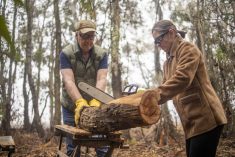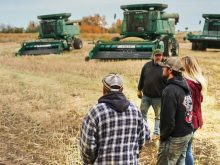Men and women who are farm founders must eventually let go of being the ultimate decision makers as they mentor the next generation to be the main farm managers. This is not an easy dance. They need to learn to let go of being in control of every part, however small the enterprise or activity — that is the definition of micromanaging.
Here are seven signs your farm manager is micromanaging:
1. They must know everything.
2. They don’t delegate.
3. They ask for frequent updates.
4. They discourage independent decision-making.
5. They dictate how tasks should be done.
6. They redo other employees’ work.
7. They don’t show trust in their teams.
Read Also

Maintain motion to ease joint stiffness
As we proceed into colder, drier temperatures, it’s common to hear reports of more joint stiffness and pain, athletic therapist Kathlyn Hossack writes.
Why do some Farm Dads dictate how tasks should be done? Why don’t they trust you?
These are good questions to ask your manager. There is a lot going on in the story your dad or mom is telling themselves about how the farm will be successful in the future. They are afraid, and they feel they cannot let you know their fears.
[MORE with Elaine Froese] How to reinvent your farm life as you age
What is it they’re afraid of?
1. They feel they are going to fail and lose everything they’ve worked for in the past four decades. This is fear of failure.
2. They are losing sight of who they are, their identity. If they are no longer the “person in charge,” who are they? When they are no longer the ultimate decision maker, who are they?
3. Equity and security of finances and income stream are important as they age. They are reluctant to sell you land as they need that security of income stream for the next three decades. They don’t want to lose wealth. How about buying out some equipment first?
4. Farmers with unhelpful beliefs are behaving the way they think things should be. You may have a different idea of how to do things and think, “different is not wrong, it is just different.” Culture is the glue holding your farm together — it’s how you behave, how you decide things and what you believe to be true. If Dad believes there is only his way of doing things, you are working with a very stubborn operator. If Mom believes she has no financial security, she needs a financial planner and accountant to help her navigate a new farm structure or agreements so you can start leveraging some of your own equity.
If you are arguing often and stomping away in frustration, it’s time for a new dance. This is not the conflict avoidance dance — this is getting folks to the table to create solutions.
Do you as the successor have a clear business plan and vision for how you want to gain more management skills and make more decisions independently of your founding parents?
Do you understand the need for more financial transparency? If you are not party to the cash flow or debt servicing picture, you are simply an employee, not a future business partner.
Can you give feedback in a respectful way to the founders when you feel you are being micromanaged?
Do you have a learning plan to gain more skill in farm management and human resources so you can start taking the lead with decision-making for your operation?
When folks need to know everything, is this a sign you are not communicating often enough to let them know what your plan is for operations or the strategy for transition? When people get cranky, it is wise not to make assumptions. It is smart to ask deeper questions like, “What is going on for you right now? Why are you needing so much information?”
A farm partner who is feeling overwhelmed may be having a hard time considering hiring a cleaning lady or outsourcing the grass-cutting duties. Letting go and learning to delegate tasks is an ongoing challenge for people who live by the code, “I should be able to do it all.”
Folks are more willing to let go of things when they have something wonderful to move toward. As farmers step back without stepping away, they want to know all tasks are well taken care of. If you have regular business meetings, you can implement a great accountability system of reporting, which keeps everyone on track.
If you want to build trust, you need to show care for the values of others, show up with competence and do your job well, and be committed by being reliable and trustworthy with integrity.
I suspect gaining more skills in conflict resolution will help you be braver and more effective in creating solutions with a tough manager.
Can you think about what your father is going through at his age and stage on the farm? Ask with the phrase, “I’m just curious, Dad, why is it so hard for you to share decision-making in this business? What are you afraid of?”
Share your feelings of frustration. Express your emotions and disappointment as you continue to wait for more opportunity to build your own equity and manage the farm operations.
Reach out to other peers for their support and suggestions of how they have found ways to encourage founders to let go.
Think reflectively about your timelines and business vision. What enterprise do you want to have total control over? By when?
Respect what each generation brings to the management team. Experience is a good teacher. New ways of doing things are not wrong. Have a ton of grace and forgiveness for mistakes when they happen and choose to find new solutions as a team. As farmers age they need to be respected for their wisdom and insights. Young farmers need to be heard.
Yes, you are a farmer. You are also a human being. Be kind and respectful to all. What you do for a living does not totally define who you are. What new things would you like to move toward?
















